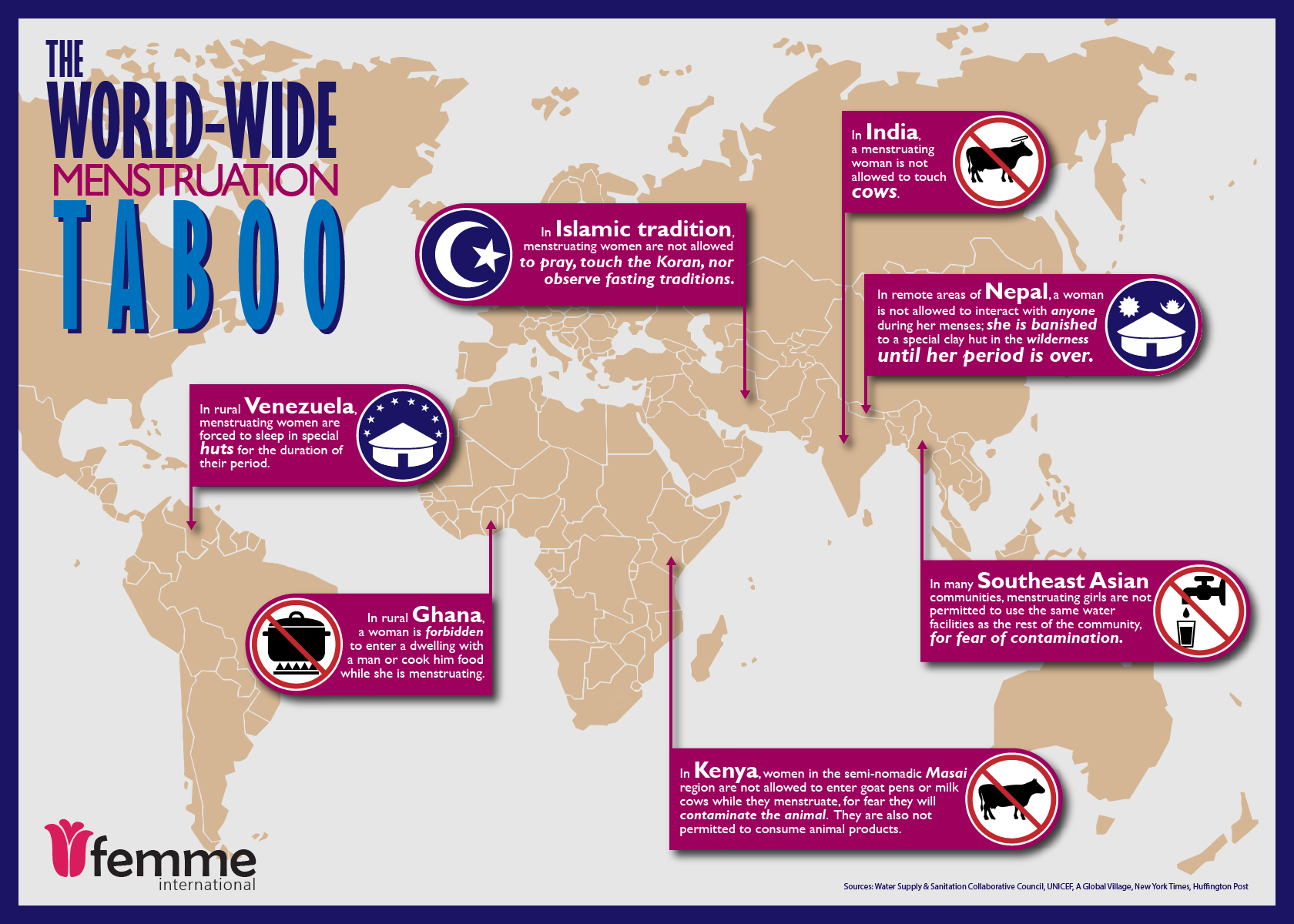
“Aunt Flo is visiting”, “the English have landed”, “strawberry week”, “the monthly statement”… There are many ways in which women around the world avoid saying the words “menstruation” or “period”. Although the secrecy around menstruations is being increasingly rejected by millenials, there are certain parts of the world where women keep being shamed and excluded when they menstruate.
For instance in Nepal, a now outlawed tradition called Chaupadi involves sending menstruating women in isolated shacks in not only uncomfortable but also dangerous conditions.
Nonetheless, there are cultures in which menstruating women are celebrated, such as Cree people in North America, who consider women on their moon cycle as sacred and have a ceremony called the “berry fast” when a girl becomes a woman.
Taboos and secrecy surrounding their menstrual cycle prevent women from accessing proper equipment and education about their own bodies, which can have serious consequences for their mental and physical health and for the environment.
 Infographic from Femme International
Infographic from Femme International
Today, a single woman menstruates for about 40 years, bleeds for approximately six years and half, and uses between 5 and 15 thousands pads and tampons. The market for sanitary products is extremely large, and players can make the most of the secrecy surrounding periods by selling items always more sophisticated, meant to be “discreet”, “efficient”, and “convenient”. However, behind those words, we can also find “shame”, “plastic intensive” and “expensive”.
First, the general obsession with discretion is really a way to disguise shame. Women have to hide their sanitary equipment, as if only the sight of it could be disturbing for men. Having individually wrapped items allows for an easy way to conceal pads and tampons in a bag.
All products are not equal. In many countries, women are not allowed to use tampons, as they are believed to break the hymen hence spoil the virginity of younger girls. There is a real misinformation regarding tampons, due to a taboo surrounding all things slightly sexual.
Second, sanitary pads have the highest environmental impact even though they are by far the most popular options. They are made of plastic and contain many chemicals, which makes them difficult to dispose of.
Although tampons have grown extremely popular since their introduction in 1933, in particular due to the freedom of movement that they allow, they remain environmentally damaging, in particular when flushed down the toilet.
Disposal issues are particularly significant in countries where the waste management system is not well developed, as used sanitary items often end up in the drain, the rivers or the ocean.
Lastly, sanitary products are expensive. In Western countries, we talk about the Pink Tax, which is the extra amount of money that we pay on women specific products, such as tampons. In developing countries, sanitary pads are simply too expensive for the lower socio-economic classes.
In Kenya for instance, buying pads on a regular basis is a luxury, which forces women to use other, less safe, methods to manage their period such as old clothes or even leaves.
In more developed countries, women are starting to look for eco-friendly alternatives to pads and tampons. The more popular options include the menstrual cup, the period underwear, the reusable pads and the tampons without applicators.
It is important that each one of us finds out what product works best for her, given her flow intensity, her activity intensity, her body needs and convenience requirements. Switching to sustainable period products is not only more respectful of the environment, but also of our bodies since they do not contain nearly as many chemicals as the disposable ones.

Menstrual cups are one of the most long-lasting options for a sustainable cycle.
Sustainable sanitary products introduced to developing countries – where sanitation and hygienic equipment are not available to all – could be a real improvement in the lives of women.
The financial burden associated with sanitary equipment would be alleviated by making one investment per person which can last for ten years if well taken care of. Women are also empowered to keep on living their education, work activities and lives in a safe and healthy way, without being paralized by their cycle every month.
Every time I am exposed to a new country, in particular in the developing world, I am reminded how privileged I am to have access to hygienic and sustainable ways to take care of my body.
Luckily, women groups such as Green The Red and Femme International have started to speak out about menstruation, health and hygiene, and sustainable ways to manage the “red week”.
During this month of March which has become special for women, let’s take some time to inquire about what it is like to fully be a woman in different parts of the world, acknowledge our own privilege and maybe look for ways to break the taboo surrounding menstruations.


